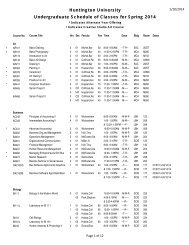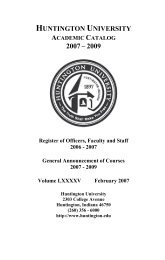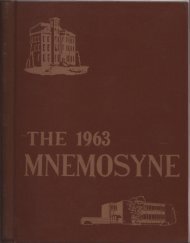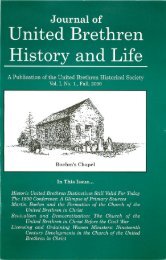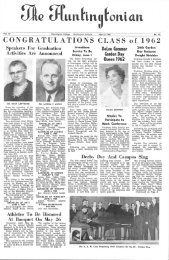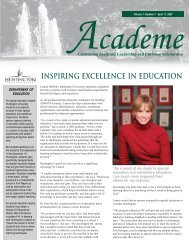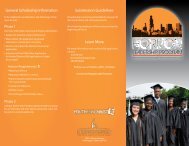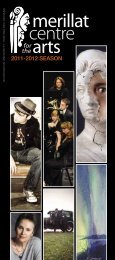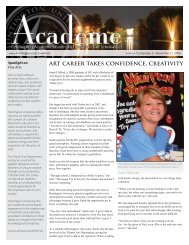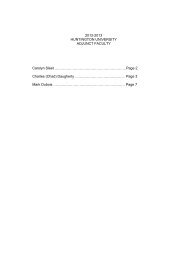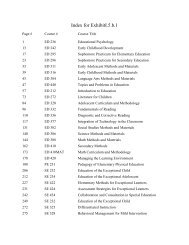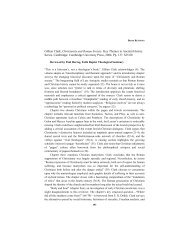THE MISSIONARY MONTHLY - Huntington University
THE MISSIONARY MONTHLY - Huntington University
THE MISSIONARY MONTHLY - Huntington University
Create successful ePaper yourself
Turn your PDF publications into a flip-book with our unique Google optimized e-Paper software.
Afternoon<br />
The afternoon session was called to order at 2.00 o’clock.<br />
Some time was given for the consideration of miscellaneous<br />
business.<br />
By motion it was decided that each worker should have<br />
his wife on the field of labor as quickly as possible<br />
after appointment.<br />
The report of the committee on Resolutions was adopted.<br />
A vote was taken on the three names suggested previously<br />
for a watchword for the mission. The word<br />
“ FORW ARD” was chosen, after which the conference<br />
stood and sang one verse of “ Onward Christian Soldiers.”<br />
The last item before the session finally adjourned was<br />
the reading of the report of the Stationing Committee,<br />
as follows:<br />
BON<strong>THE</strong> STATIO N : Rev. and Mrs G. D. Fleming,<br />
Miss Mabel Shultz, Miss Ellen Rush, James T. Harvey,<br />
Mrs Lucy Caulker, Marion George.<br />
VICTORIA STATION : A. Nelson.<br />
T A N IN IH U : S. W. Mosier.<br />
GBAMGBAMA: To be supplied.<br />
DANVILLE STATION : Rev. and Mrs. Lloyd Eby,<br />
Dayton T. Seeley, Arthur S. Yarn, A Tailor teacher to<br />
be supplied, J. T. Claye.<br />
MOKELLEH STATION : R. A. Morrison.<br />
PEG IBO U : H. A. Williams.<br />
Henry J. Becker, Traveling Itinerant.<br />
Conference cloosed by singing “ Blest Be the Tie that<br />
Binds,” and prayer by Rev. Lloyd Eby.— R.A. Morrison,<br />
Secretary.<br />
A COUNTY FAIR IN AFRICA<br />
Rev. Lloyd Eby<br />
No, it wasn’t really a County Fair, because we have<br />
no counties. It was an Agricultural Show for the southern<br />
Province of Sierra Leone. The Government holds an<br />
annual agricultural show in each of the three Provinces<br />
to encourage the natives to farm more extensively, and<br />
in a more modern manner.<br />
Through the kindness of the Elder Dempster Agent, we<br />
went and returned in a launch, and thus what would<br />
otherwise have been a hard trip became a pleasure. We<br />
were anxious to go, as we are attempting to do a little<br />
more agricultural work at Danville. It proved a great<br />
help to us in laying our plans for the future. We hope<br />
to be among the exhibitors next year. The District Commissioner<br />
looked after us handsomely, giving us a new<br />
house in the D. C’s compound.<br />
There were many things of interest, but I will only mention<br />
a few :<br />
An exhibit of 36 different kinds of rice attracted some<br />
attention. We were interested in the cocoa, as we have<br />
1000 trees growing at Danville and Victoria.<br />
Some yams weighing around 300 pounds were a curiosity<br />
to me. The natives couldn’t understand why these<br />
did not get the prize instead of the smaller ones. The<br />
reason is that they are really of no use, being too tough<br />
to eat.<br />
The woodwork and wickerwork and native clothes, were<br />
interesting to look at, and there were many queer looking<br />
objects carved out of wood, and a few were exceptional<br />
good workmanship.<br />
While perhaps not as beneficial, there were some interesting<br />
things outside of the show. The natives themselves<br />
were the most interesting study to me. There were 42<br />
Paramount Chiefs present. What with their attire, they<br />
afforded' a good study in colors. Red velvet and gold<br />
braid was the “ predominant note,” as the fashion reviews<br />
<strong>THE</strong> <strong>MISSIONARY</strong> <strong>MONTHLY</strong><br />
put it. One old man had a large silver crown (I have<br />
no reason to doubt its being silver) . One m adam chief<br />
wore an old silk plug hat and heavy men’s boots.<br />
The Mohammedan chiefs could be recognized by their<br />
fez. Each chief had his retainers, including his drummers<br />
and dancers. There was plenty of action and more noise.<br />
I’ve not tired as' yet of watching them.<br />
Speaking of their drumming, I would like to say this<br />
good thing about them. There wasn’t the sound of a<br />
drum on Sunday until after 6:00 P. M. Almost an example<br />
for Christian America. Eh, what!<br />
The queerest incident I have yet seen happened while<br />
here. It shows that superstitions and fears are found<br />
more or less under the newly adopted clothes of civilization<br />
: While Lady Slater, the Governor’s wife, was handing<br />
out the prizes, the 42 chiefs were sitting decorously<br />
in a long row in front of the Governor’s p a v ilion ; their<br />
retainers grouped behind them. With other visitors, the<br />
crowd numbered thousands. All at once a sharp cry was<br />
heard at the extreme left, and about twenty men were<br />
seen running. In less time than it takes me to write it<br />
a dull roar came from the whole crowd. The decorus<br />
chiefs forgot their dignity and sprinted for the town<br />
on the right. Their retainers did the high-jump over<br />
the chief’s chairs, and in two minutes the crowd was in<br />
a stampede for town. In two minutes more they were back,<br />
and nobody hurt. Why all the fuss? It will remain one<br />
of those unexplained mysteries. One ran because the<br />
other ran. No. 1 runner has not been found yet. A fine<br />
example of African fear plus superstition, minus reason,<br />
and incidentally the greatest enemy of Christianity.<br />
The Government is to be commended for its many e fforts<br />
toward the betterment of these people. Most of the<br />
officials are working hard to help the natives. W e have<br />
a fine example of Britain’s successful colonial policy in<br />
Sierra Leone. Governor Slater is a good man. He is<br />
doing his best to better his country, and realizes the importance<br />
of and encourages missionary effort.<br />
We are attempting to make our land more productive,<br />
and by example, show these people how to make a better<br />
living. Their present system of clearing a new patch<br />
of ground every year cannot last much longer. There<br />
are so many people that the land is not left long enough<br />
idle to regain its fertility. They must therefore learn<br />
how to fertilize and keep improving the same piece of<br />
ground.<br />
Our great hindrance at Danville in the development<br />
of agriculture, even as other things, is the lack of funds.<br />
It seems the Lord’s work is always held back for this<br />
reason. However, we are grateful for the sacrifice many<br />
are making to enable us to carry on a little work for<br />
Him in needy Africa.<br />
AN UNOCCUPIED FIELD<br />
From Northern Congo up through British Sudan to the<br />
east of the continental divide which marks the boundary<br />
of British and French Sudan, another 1,000 miles; to<br />
the northwest in the direction of Lake Chad, considerably<br />
more than 1,000 miles; west northwest toward Nigeria,<br />
more than 1,500 miles, and west into the Cameroons, more<br />
than 1,000 miles— along all these lines there is no Protestant<br />
mission or missionaries! Who can view the vastness<br />
of this territory with no Gospel light and realize<br />
the many tribes whose languages must be reduced to writing<br />
before the people can get the Gospel message, without<br />
a conscious call to pray “ the Lord of the harvest” to send<br />
forth laborers? If we do not pray, “ how dwelleth the love<br />
of God in u s!”<br />
3



